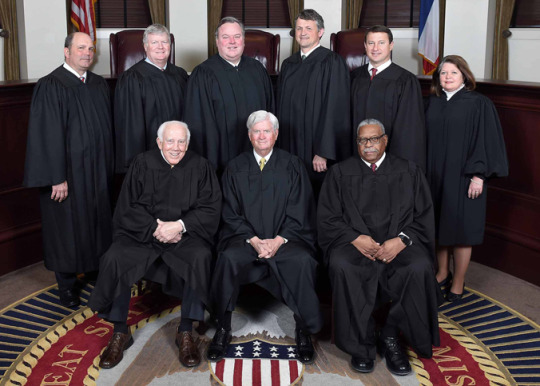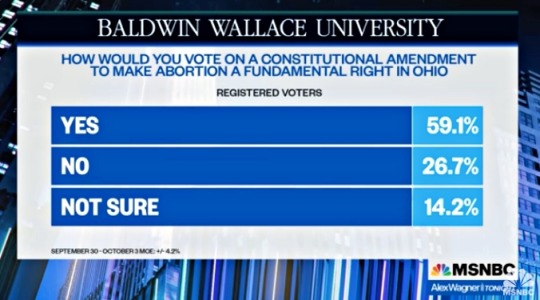#ballot initiative
Link
49 notes
·
View notes
Text
Well, election day is now in the bag and, though many results are yet to be settled such as who will control each of the houses of Congress, there's quite a bit that we can say for sure. I'll mostly skip over the big headline stories as I imagine you've seen those already and focus on smaller ones that I consider interesting, prepare for a LONG RANT (TM).
THE BIG STORIES
All right, just to get this out of the way, the predicted "red wave" did not happen. Republicans did okay and they're on track to control the House and have an outside shot at the Senate, but it wasn't supposed to be this close. A combination of bad candidates, skewed polling (a lot of Republican-allied pollsters released a ton of polls in the final stretch, seemingly skewing the averages), and some generally unpopular leaders and policy positions have put them in a position where this might just be the best midterm result for a party that controls the Presidency since 2002.
In the Senate, Democrats won the Senate races in Pennsylvania, Colorado, and New Hampshire where Republicans had made a push while Republicans won the races in Florida, North Carolina, Wisconsin, and Ohio where Democrats had made a push. The races in Arizona and Nevada are still uncalled (the Democrat leads in AZ and the Republican in NV) while Georgia's race will go to a runoff because no one got over 50%. Of the three races that are yet to be decided, the party that wins two of them will control the Senate.
As far as governorships, Democrats held Wisconsin, Michigan, and Kansas and flipped Maryland and Massachusetts which had had moderate Republican governors as a holdover from the Obama years. Republicans held Florida, Georgia, and Texas where Democrats made a push. Meanwhile, Arizona and Nevada are both uncalled at this point, in AZ the Democrat leads and in NV the Republican does, both of which would represent a flip if those leads hold.
STATE LEGISLATURES
Now, onto the less "headline" stuff. People don't pay a ton of attention to state legislatures, but they're super important. Most of the governing that actually matters to real people happens in the states, many state legislatures have been gerrymandered to the point where they no longer truly match the opinions of the voters, and many other states are simply so far in one column or the other that there's not a real competition. That said, two swing states defied their gerrymandering and tilted toward the Democrats (none went to the Republicans).
Michigan held its first election under new district maps ordered by the courts after they found that the previous were so gerrymandered as to infringe on the rights of voters to choose their own representatives. The result is that Democrats will now control the State Senate and the State House is currently 53-53 with 4 races too close to call (Democrats currently lead in 3 of those 4 districts). Since they held the governorship these results would give the Democrats total governing control of the state which is impressive for a state that featured total Republican control as recently as 2018.
In Wisconsin the Democrats did not win enough seats to take control, not even close, but they were able to overcome one of the most severe gerrymanders in the country to prevent the Republicans from obtaining a supermajority in the state legislature. With a Democratic governor, this will allow Democrats to sustain his vetoes and prevent the Republican legislature from simply overriding him and governing alone.
MEDICARE, ABORTION, AND THE MINIMUM WAGE
I'll talk about other ballot measures in a bit, but I wanted to look at these three in particular because they share two features in common. (1) All three are generally supported by Democrats and opposed by Republicans and (2) all three are very popular when put to a popular vote.
South Dakota this election voted to expand Medicaid which makes it the seventh state to expand Medicaid via ballot measure after the governor and legislature refused to do so. In fact, this particular question has never failed in any state when brought to a vote. There are now only 11 states that have not expanded Medicaid under the Affordable Care Act (Obamacare), it will be interesting to see how many of them continue to hold if ballot measures are offered.
Nebraska this election increased its minimum wage, voting to increase it to $15 an hour by January 26th. In the last six years there have been 8 ballot measures to increase the minimum wage in states as politically diverse as Maine, Arizona, and Arkansas. All have passed fairly convincingly. In fact, you have to go back to 1996 to find the last time that a minimum wage ballot measures failed.
Abortion was also on the ballot in five states this election. California, Vermont, and Michigan enshrined the right to abortion in their state Constitution and voters in Kentucky and Montana rejected measures that would have restricted abortion. In fact, to the best of my knowledge, no state has passed a ballot measure restricting abortion and many have passed measures protecting abortion since the overturning of Roe v. Wade, even states ordinarily considered to be extremely pro-life in their politics like Kentucky and Kansas.
OTHER BALLOT MEASURES OF INTEREST
As far as other ballot measures go, five states had ballot measures to legalize Marijuana and two of those passed. Pot will soon be legal in Maryland and Missouri, but not in Arkansas or South Dakota (or North Dakota probably, but they're still counting). That will make 21 states where pot is fully legal for medicinal and recreational use.
Unions had a bit of a mixed bag. Illinois passed a measure to protect union membership while Tennessee passed a "right to work" measure. It's probably a net positive for unions given that they're gaining in Illinois and nothing really changed in Tennessee (which already had right to work laws approved by the state legislature), but it's definitely a sign that their arguments aren't breaking through everywhere.
Arizona made a huge step toward limiting medical debt. They just passed a measure that limits interest on medical debt to 3% and limits the ability sieze property and wages for medical debt. Also in the southwest, New Mexico passed a measure to improve pre-K childcare with money from the state's sovereign wealth fund. Both of these are kind of sleeper issues that seem to cross partisan lines so definitely worth keeping an eye on.
Finally, on a more personal note, California passed a measure to increase spending on arts programs at public schools. As the spouse of a music teacher, I approve of this.
CONCLUSION
Overall the results paint an interesting picture of the politics of the country. We are overwhelmingly in favor of some things that Democrats support, but we're pretty split as far as the parties themselves. Candidate quality did end up mattering quite a bit, it's easy to imagine an alternate reality where Republicans won the Senate seats in Arizona, Georgia, and Pennsylvania quite easily with better candidates, and so did major issues like abortion that were kept forefront in some voter's minds despite economic headwinds. The stars aligned this time around to prevent the blowout that usually happens in a President's first midterm (Trump lost 40 seats in the House and Obama lost 60), but we probably won't have full Democratic control of Washington come January.
Keep an eye on the issues, though, I have a feeling that we're going to be seeing more direct democracy and it will be interesting to see how the voting publics even in states that are pretty solidly in one part or the other differ from the expressed opinions of their representatives.
Hope you enjoyed this or at least found it interesting!
#politics#us politics#2022 elections#midterm elections#ballot measures#ballot initiative#state legislatures#long rant (tm)
40 notes
·
View notes
Text
Florida Supreme Court gives voters final say on recreational marijuana

View On WordPress
0 notes
Text
The malignant Magnolia State.

November 21, 2022
It was US Supreme Court Justice Louis Brandeis who in a 1932 dissent popularized the phrase that the states "are the laboratories of democracy." But wait until you hear about the concoction coming out of the not-so-great state of Mississippi's lab.
In 1916, the Mississippi Legislature approved a resolution to add an amendment to the state's constitution granting citizens the right to put issues on the ballot and vote them into law (known as initiative). Back then nearly 70% of those who could vote (no women or Blacks, of course) backed the amendment. But in 1922, the State Supreme Court struck it down on a technicality after a state official disputed a ballot proposal to reduce his exorbitant salary.
Seventy years later, Mississippians again added the ballot initiative process to their constitution (Section 273). And now, for the second time in a century, the Mississippi Supreme Court (pictured above, including its token members) has eliminated direct democracy in that state. Again, on a technicality.
The case resulted from one small-town mayor's opposition to a statewide medical marijuana program that had been overwhelmingly approved by the voters. The Court (in a 6-3 decision) found that since Section 273 says citizens collecting signatures to get an issue on the ballot must collect one-fifth of them from each of the state’s five congressional districts and since the state lost a district in the 2020 census, the initiative process is now null and void.
Said the executive director of Mississippi's Medical Marijuana Association, Ken Newburger, "It's a sad day for Mississippi when the Supreme Court communicates to a vast majority of the voters that their vote doesn't matter." A sad day, indeed. The Court's ruling not only eradicated the medical marijuana program, it also abolished several other proposals. Including a new (non-Confederate) flag design approved by 73% of voters and an election reform measure that 79% of the electorate supported.
Also doomed was a signature-gathering effort to put Medicaid expansion on the ballot. Since 2014, Mississippi's Republican governors have rejected more than $7 billion in federal funding to broaden Medicaid eligibility. As a result, many of the state's poorer residents have no health insurance, nearly two-thirds of its rural hospitals are in danger of closing, and Mississippi has the worst health outcomes in the nation.
Last spring, the state's GOP-controlled legislature made an attempt to restore the initiative process. But the 2022 session ended with them failing to do so. Seems the reason was some members wanted to make the procedure much more difficult. It's Mississippi, after all.
0 notes
Text
Chuggers v TJ's

18 notes
·
View notes
Text
the people arguing on my post about voting are driving me insane because like. i don’t think voting is that important or that there are big difference between candidates in bourgeois political parties--but they do--and if you genuinely think that voting is the lifeblood of politics and elections are of critical importance and can change the world, then Surely holding the position that ‘it doesn’t matter who you vote for, what matters is that you vote!’ goes from being bloviating self-congratulatory garbage (which is what i think it is) to being unbelievably morally irresponsible. like when an anti-electoralist says ‘it doesn’t matter who you vote for’, you can disagree, but that’s a consistent worldview--if you’re heavily invested in the electoral process but still pull this ‘bipartisan compromise’ ‘heal the nation’ nancy pelosi routine you’re a freak and there’s no hope for you
#to be clear i DO think that it's important to vote on local matters AND on any ballot initiatives/plebiscites your jurisdiction might have#also lol at the guys who are like 'if anyone tells me who to vote for i go BEAST MODE' like okay john galt chill out
119 notes
·
View notes
Text
House Republicans are working on new legislation to prevent foreign nationals from influencing America’s political process, Axios has learned.
Why It Matters: The last two presidential elections have been colored by allegations that foreign influence helped the GOP.
• Now House Republicans are trying to flip to script and draw attention to foreign donations to Democrat-aligned and progressive nonprofit organizations.
• Non-U.S. citizens can’t contribute to candidates, campaigns, or super PACs, but they can give to 501(c)(4) organizations, which are tax-exempt groups that can engage in general issue advocacy, and support state ballot initiatives.
Driving The News: Rep. Bryan Steil (R-Wis.) chair of the House Administration Committee, is introducing legislation to ban such groups from contributing to political committees for four years if they accept foreign donations. He also wants to bar foreign nationals from giving to state ballot initiatives.
• “American elections are for American citizens,” Steil told Axios, ahead of a hearing his committee is holding in Atlanta today on election integrity. “Yet foreign nationals still find ways to influence American elections.”
• “The American Confidence in Elections (ACE) Act will close loopholes that foreign nationals are exploiting to funnel money to super PACs or ballot initiatives,” he said.
• His hearing will draw on a new report from a conservative group, the Americans for Public Trust, which tries to show how Hansjörg Wyss, a Swiss billionaire, has influenced U.S. elections and policy through two nonprofits he controls: The Wyss Foundation and the Berger Action Fund.
• “It’s time for Congress to close the foreign influence loophole that allows foreign dark money to flood the American electoral and political system," said Caitlin Sutherland, executive director of Americans for Public Trust.
The Other Side: "The Berger Action Fund does not support or oppose political candidates or parties, or otherwise engage in political campaigns," said Marneé Banks, a spokesperson for the Wyss Foundation and the Berger Action Fund.
• "Berger complies with all rules governing its activities and has established strict policies prohibiting funding from being used for get-out-the-vote or voter registration," she said.
• "We also support increasing transparency and accountability in our campaign finance system through the DISCLOSE Act."
The Big Picture: The combination of artificial intelligence, social media and unregulated spending will make the 2024 presidential election vulnerable to foreign interference on behalf of both parties.
• Malicious foreign actors, including Russia’s Yevgeny Prigozhin, head of the Wagner Group, have boasted about how they ran influence campaigns in America during the last presidential campaign — and plan to do it again.
• Meanwhile, big tech companies are relaxing some of their policies designed to curb misinformation around COVID-19 and the 2020 election, making 2024 more of a free-for-all on social media.
• State and local election officials can work to safeguard the voting process, but in a free and open society it’s close to impossible to prevent foreign actors from trying to persuade Americans via open — or clandestine — influence campaigns.
Zoom In: Conservative groups are zeroing in on Wyss as a poster child for how wealthy foreign billionaires can influence U.S. elections, alleging that he has pumped $475 million into the U.S. political system.
• In 2021 alone, his Berger Action Fund gave some $72 million to a dozen different nonprofit organizations, including the Sixteen Thirty Fund, which advocates for progressive causes, according to the Associated Press and tax filings.
• Those 501(c)(4) nonprofits, like the Sixteen Thirty Fund, can give directly to superPACs that support the Democratic agenda, the New York Times has reported.
• "The problem is that c4's are a bit of a black box when it comes to campaign finance laws," said Saurav Ghosh, the director of the Campaign Legal Center, a Washington-based nonpartisan watchdog group.
Flashback: Republicans and Democrats have been hit with big fines for accepting foreign money.
• Last year the Federal Election Commission fined Barry Zekelman, a Canadian billionaire, $975,000 for steering some $1.75 million to a pro-Trump super PAC in 2018.
• In 2019, the FEC issued $940,000 in fines to the super PAC supporting former Florida Gov. Jeb Bush's 2016 presidential bid and a Chinese-owned corporation that made illegal donations to it.
• In 2002, the FEC imposed $719,000 in fines in response to a 1996 Democratic Party fundraising scandal involving donations from China, Korea and other foreign sources.
#us politics#news#Axios#2023#foreign lobbying#foreign election interference#us house of representatives#republicans#conservatives#super pacs#Rep. Bryan Steil#House Administration Committee#American Confidence in Elections Act#ballot initiatives#Americans for Public Trust#Hansjörg Wyss#The Wyss Foundation#Berger Action Fund#Sixteen Thirty Fund#the new york times#federal election commission
22 notes
·
View notes
Text
0 notes
Text
youtube
Reproductive rights activists in Ohio have gathered way more than enough signatures to put a reproductive freedom amendment to the Ohio constitution on the ballot in November. The measure would need only a simple majority to go into effect.
However the heavily gerrymandered GOP legislature is conducting a special election in August to try to pass a measure to raise the threshold to pass constitutional amendments from 50%+1 to 60%. So if the August amendment passes, the November reproductive protection amendment would then require 60% to pass.
Why 60%? This Ohio poll from last autumn just may provide an answer.

If the August rightwing GOP amendment passes with a simple majority, that would make it harder to pass the reproductive freedom amendment in November.
Summer elections usually have poor turnouts. That's why the Republican legislature broke one of its own rules about August elections to place it there.
Ohio Abortion Protection Amendment Gets Signatures Necessary for Ballot Access
With 710,141 signatures, the movement surpassed the 413,000 signature threshold to appear on the ballot in November
In practical terms, this is a two-stage ballot measure. So save these dates...
Support Reproductive Freedom in OHIO:
+ On August 8th – Vote No (on GOP blocker)
+ On November 7th – Vote Yes
If you are a legal resident of Ohio who will be 18 by August 8th, you have until 30 days before the election to register. July 10th is the registration deadline for the August election. It's usually best to register in person in case you need to sort out any issues. But if that's not possible, the Ohio Secretary of State lets you register online. Read the instructions carefully and assemble the necessary information before beginning the process.
Online Voter Registration – Ohio Secretary of State
A perennial reminder: If you have moved since the last election (even next door), you need to register at your new address. Voting is geographic.
If you're not in Ohio but have friends there, feel free to forward this information to them.
If the reproductive freedom measure passes in November then that may pave the way for other reforms such as a badly needed one on gerrymandering. It will certainly scare Republicans. 😁
#ohio#ballot initiatives#constitutional amendment#reproductive freedom#abortion#the sanctity of reproductive freedom#a woman's right to choose#roe v. wade#dobbs v. jackson women's health#pro choice#republicans#the gop#the far right#republican male patriarchy#gerrymandered ohio legislature#alex wagner#marcela azevedo#david pepper#register and vote
10 notes
·
View notes
Text
NYTimes: The Surprising Places Where Abortion Rights Are on the Ballot, and Winning
No paywall.
36 notes
·
View notes
Text
Florida attorney general rejects recreational marijuana amendment
Florida Attorney General Ashley Moody has filed a brief with the Florida Supreme Court detailing why she believes the proposed measure to legalize recreational marijuana should not be placed on the ballot for voters to decide.
She may oppose the language, but there’s little denying the economic impact of cannabis since it was approved in 2016 for medicinal purposes.
The nearly 30,000 statewide…

View On WordPress
0 notes
Link
The GOP's war on ballot initiatives often follows a similar pattern. First, Republican hardliners gain total power in a given state then try to permanently entrench themselves by passing gerrymanders and voting restrictions. Second, voters respond by attempting to pass progressive policies, voting rights protections, and anti-gerrymandering laws directly at the ballot box. Third, Republicans counter with restrictions on the initiative process itself. Lastly, if all that fails, Republicans refuse to enforce or even outright repeal voter-backed laws and stack state courts to help them do so.
2 notes
·
View notes
Text
Michigan is fucking BLUE, baby!!!
Whitmer, Nessel, Benson - re-elected!
Prop 1, Prop 2, Prop 3 - passed!
Democratic control of the State House and State Senate for the first time since 1983!!!
BLUE WAVE, MOTHERFUCKERS

#now let's make the next two years COUNT#Prop 2 is already a good start at protecting elections#make it so Republicans can never prevent a free fair and open election in any way again#or weasel their way around ballot initiatives#or sneak them through the legislature with 15% of the vote#screaming in the car on my way to work#and cackling like a madman#FUCK YEAH MOTHERFUCKERS#WE'RE BLUE BLUE BLUE!!!#(national politics is a little grimmer)#(but let me have this)#(this has never happened in my state in my entire adult life)
5 notes
·
View notes
Text
We keep trying to restrict what students can learn in the classroom. (No CRT, removing the word "slavery" from Texas curriculum, skewed education on the civil war)
We don't listen when they try to sue the government for the right to a habitable planet.
We don't listen when they want gun legislation towards safety in their classrooms.
We don't listen when, despite speech censorship, they find a way to talk about LGBTQ+ challenges in their graduation speeches.
More and more I'm convinced that if our two party system keeps undermining young people that we need to amend the constitution and lower the voting age. They at least deserve a say in this political farce.
#political commentary#amend the constitution#lower the voting age#pass ranked choice voting#legislate by ballot initiatives#especially since Congress seems to abdicate their legislative duty#while simultaneously cutting the power of governmental agencies vested with authority to legislate#can you here me now?
2 notes
·
View notes
Text
People who try to analyze what happened on Tumblr on November 5th, 2020, often really overstate how much it was actually “about” Supernatural. As someone who has never been in the supernatural fandom ever but dID join in on the hysterical destielposting—it was really more about the stress of the pandemic and the 2020 presidential election.
The two biggest Youtubers I’ve seen try to dissect “what happened that November 5th” in video essays both weren’t American—- and I think that explains why they both tried to explain the hysteria primarily via analyzing the Supernatural fandom/the original show, rather than through the lens of the election. And while those videos are cool, valid, informational, and make lots of really well-considered interesting points— I can tell you that me and almost all my mutuals had literally no knowledge or interest in the fact that “oh supernatural had made nods at the ship in the past but the creators were adamant that I wouldn’t be canon” or etc etc etc etc. the first time I learned about any of that context was way later, watching videos where people claimed that fandom history context (that I did not know anything about) was the actual reason for the hysteria.
But the reality is that people latched on to the Destiel stuff because it was a piece of big useless inane zero-stakes fandom news in a time when we were desperately waiting for serious high stakes election news. We were latching onto a “positive “ piece of inane stupid fandom news in a time of great stress, with all the desperation of a drowning man who latches onto whatever piece of wood will keep him afloat.
The core of the hysteria was that Americans (who make up a huge chunk of tumblr’s userbase) were currently glued to their laptops watching the live presidential election vote counts come in. These vote counts were taking an extended amount of time due to the pandemic causing high numbers of mail-in ballots, resulting in a constant state of Election Day Stress for multiple days straight.
This was also during the height of the Pandemic. People had predicted Trump’s presidency would be bad; no one had predicted it would be this apocalyptically bad. No one had predicted pandemics and lockdowns and hospitals overflowing with bodybags. remember Trump spreading Covid lies and conspiracies?? There were so many Qanon conspiracies about democrats being Satanic child traffickers who had to be put to death, and coup threats were mounting from the right wing side. It seemed like this election was a choice between ‘centrist democrat’ and “apocalyptic right wing conspiracy theory authoritarianism,” in the midst of pandemic conditions that people feared would never ever improve— and it seemed like a close election.
Another major point was that Trump voters were more likely to be antimaskers/Covid deniers, while Biden voters were more likely to take the pandemic seriously— so Biden voters were more likely to send in mail-in ballots instead of risking the in-person voting crowds, which meant their ballots would take much longer to count. And so, in many state electoral vote counts, it would initially seem like Trump was very far in the lead— only for Biden to slooooowly build up an agonizingly small lead as the mail in ballots came in, and then defeat Trump at the very end.
So you’re just watching these news sites giving live election updates, refreshing the page every 2 minutes to see if you’re going to live under a spineless centrist democrat or a literal Qanon Dictatorship. And then you go on tumblr to distract yourself, and there’s more election posting, and more agonizing over the votes, and more stress and despair—-
And then it’s been days and we’re right at the crucial tipping point where it’s anyone’s game and the next few hours will determine whether Trump will win, so you need to keep your eye on the vote count, because the next hours will determine the future of the pandemic and your country and your plans for your entire life—
And then stupid Destiel becomes canon! And it becomes canon in the silliest way possible!
If Destiel had become canon at any other time, it would have been a big goofy tumblr celebration? But we wouldn’t have gotten the insane explosion of hysterical interaction.
The entire core of it was the contrast between the inane meaningless stupidity of fandom news vs the actual stressful election news you wanted to hear! It really is best conveyed in that meme where Castiel says “I love you” and Dean indifferently responds with a piece of important election news.
It’s about the contrast between the low-stakes inanity of fandom and the massive life-destroying stakes of a terrifying election. There really was no reason it had be Supernatural specifically, except that Supernatural was a thing everyone knew basic things about from dashboard osmosis— it could’ve been any other equally huge silly fandom ship news about a ship everyone *knew of* but might not necessarily be invested in (ex. Stucky becoming canon, Johnlock becoming canon, Kirk/Spock becoming more canon somehow, etc etc etc.)
I think it’s true that people who weren’t paying agonizingly close attention to the American election news got swept up in it, and that non American Supernatural fans also were extremely excited for purely fandom reasons — but the entire reason it blew up to an unprecedented degree was because of that core of stressed out terrified Americans glued to their computers watching election results and suddenly receiving stupid fandom news instead, and deciding to just hysterically parodically hyper-celebrate this absurd useless zero-stakes news.

I think it was also all elevated by the fact that, as I said before, this happened at the crucial “tipping point” of the election where the next few hours would determine the winner. The fact that Biden began to slowly develop a lead in the hours after made it feel, hysterically, as if the hours after Destiel became canon was somehow the turning point where he began to win; so celebrating Destiel felt like celebrating that slow turn towards victory.
The tl,dr is that it’s so important to Remember the Fifth of November …..in preparation the inevitable hysteria that will happen in the presidential election on November 5th of next year. XD. Personally I’m rooting for Johnlock or Frodo/Sam to somehow become canon in the eleventh hour right before the democrats win
#November 5th#november 5 2020#the fifth of november#just a random ramble#November 5th 2020 is such an important day to me#it really is a holiday#but it does confuse me when I see people analyzing it primarily as a supernatural thing#instead of a ‘hysteria over an election reaches a breaking point when inane zero stakes fandom news comes out and we all latch onto it’thing#but yeah!!#this is my personal essay out of love for the holiday
19K notes
·
View notes